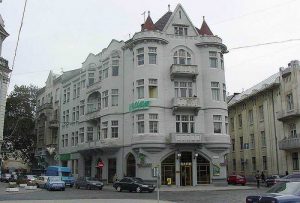
Lviv is a city in western Ukraine. Due to its location, it is currently receiving fewer bombs than other Ukrainian cities further east, such as Mariupol, Kharkiv or Kyiv, although from time to time it is also the target of Russian shelling. To get an idea of the changes in the borders of this part of Europe over the last century, it is worth remembering that Lviv and much of western Ukraine and Belarus were part of Poland before World War II. At that time Lviv was called Lwów and a formidable mathematical school led by Stefan Banach emerged there in the 1920s. In a way, Banach’s mathematical school was as powerful as it was singular, because many of the problems that were investigated arose in discussions that took place in the Scottish Café in Lwów, where the mathematicians had long and hard-fought discussions (for more details see chapter 3 of my book Pasiones, piojos, dioses…y matemáticas or the entries in this Blog: Stories of the Scottish Café, 1. Steinhaus and Banach, 2. The mathematical gathering, 3. The Scottish notebook, 4. The Scottish Café awards). The importance of Banach’s school is attested to by the fact that his name, like that of other members of the Tertulia, has become a frequent adjective in the vast mathematical toponymy; in particular, vector spaces – they can have both finite and infinite dimensions – in which the length of vectors can be measured but where the Pythagorean theorem need not be true, bear the name of Banach.
At the outbreak of World War II, the west of what was then Poland was occupied by Germany, while the east was occupied by the Soviet Union, as part of the agreement that Stalin and Hitler signed, which was called the Ribbentrop-Molotov Pact (after the German and Russian foreign ministers). In the summer of 1941 Germany revoked the pact and invaded the Soviet Union. Lwów fell into Nazi hands, and the Nazis carried out a thorough extermination similar to the one they had already carried out in western Poland, killing many of the mathematicians in particular. The rest, Banach among them, survived by feeding lice, which were necessary for the preparation of a typhus vaccine that was being prepared in university laboratories, and which both Soviets and Germans kept in production (more details in my book Pasiones, piojos, dioses… y matemáticas or the posts in this Blog: Historias del Café Escocés: 5. Wartime gatherings y 6. Feeding lice).

On their way to Berlin, the Soviets recaptured this part of Poland in the last year of World War II. When World War II ended, the entire area of Poland occupied by the Soviet Union as a result of the Ribbentrop-Molotov Pact became part of the Soviet republics of Ukraine and Belarus. To compensate, Poland was ceded all of East Prussia and part of West Prussia. A terrible process of ethnic cleansing then took place: Germans from the area ceded to Poland were forced to move westwards, and Poles from the Soviet-occupied area were moved to the German area ceded to Poland. In particular, what remained of the mathematical school that Banach had founded in Lwów ended up in Breslau. The change from Polish city to Ukrainian forced a change of name and Lwów was renamed Lviv; similarly, Breslau, when it changed from a German to a Polish city, changed its name to Wroclaw.
It so happens that the German mathematician Felix Hausdorff, who was very influential in the Banach school, was born in Breslau in 1868, although he did not witness those terrible events, as the Nazi steamroller had passed over him a few years earlier: Hausdorff, together with his wife and a sister-in-law, committed suicide in early 1942, to avoid being interned in a concentration camp: the Hausdorffs were Jews.
Banach did not have to leave Lwów either, because he died of lung cancer in August 1945; it seems, although this may be a legend, that Banach’s funeral in Lwów was turned into a patriotic act by the last Poles still living there.
References
Antonio J. Durán, Pasiones, piojos, dioses…y matemáticas, Destino, Barcelona, 2009.

Leave a Reply